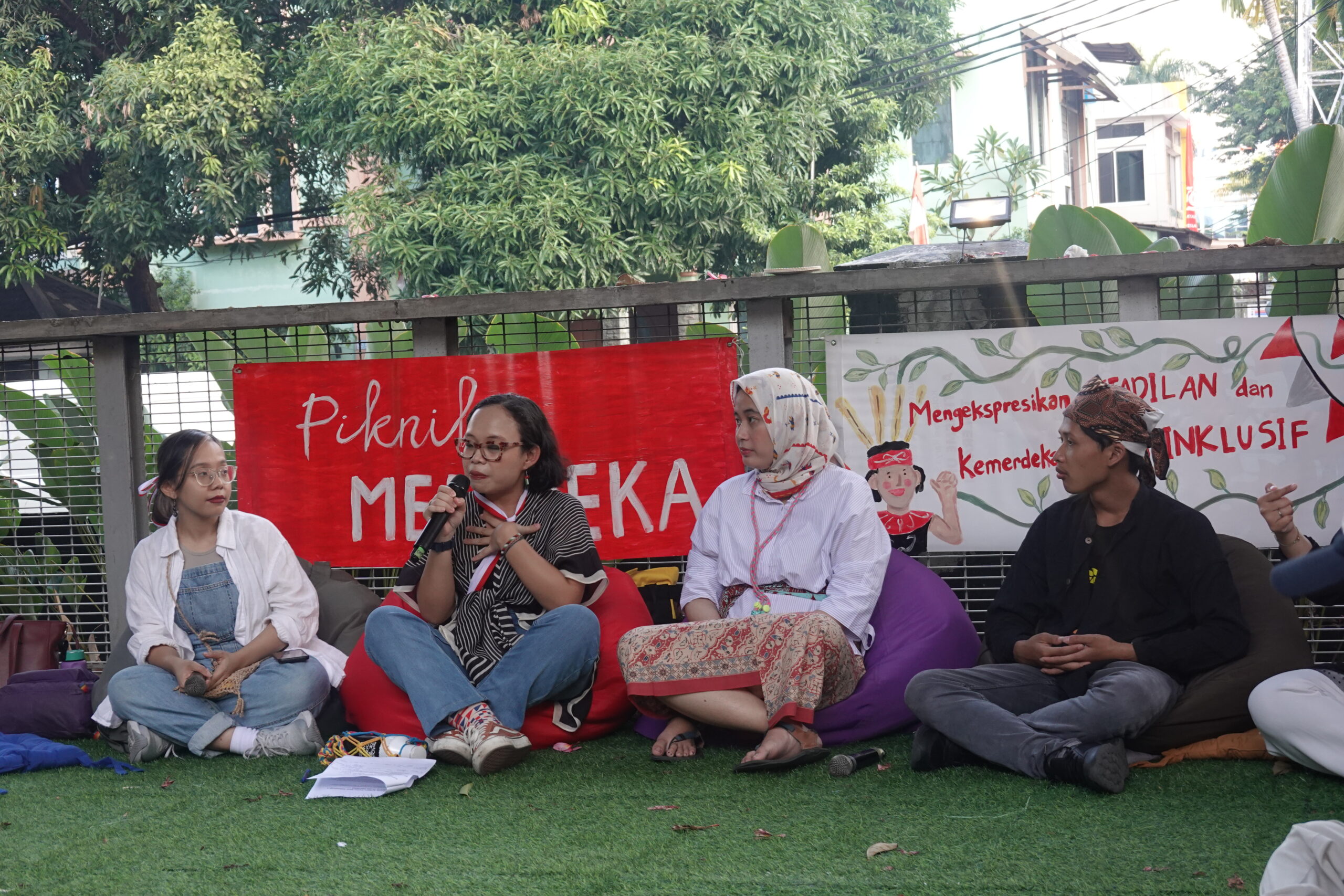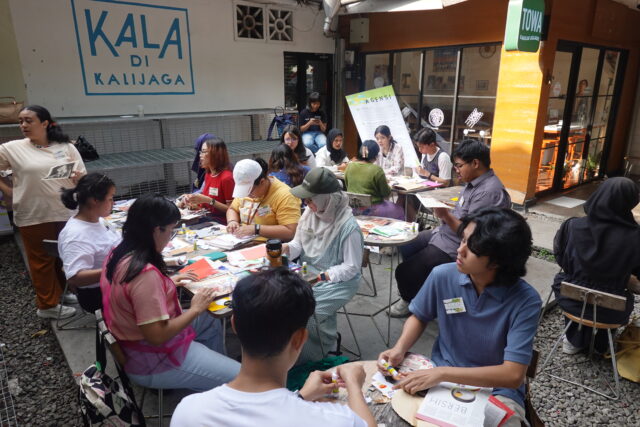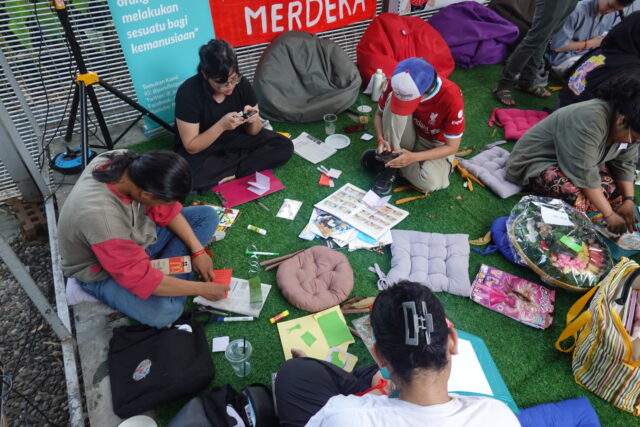
Uncategorized | September 3, 2024
We Can Be Free Together by Caring for Each Other
Nisrina Nadhifah Rahman
There are always various nuances when discussing “independence.” On the one hand, we are undoubtedly privileged compared to previous generations who could not freely and openly express their Indonesian identity under colonialism. However, on the other hand, the independence of the Republic of Indonesia also calls for critical reflection on what independence truly means. If we consider ourselves “independent,” we must ask: from what are we independent, and how is this independence realized?
On the afternoon of August 18th 2024, Humanis, in collaboration with PurpleCode Collective, Pamflet, and Kemitraan, held a casual discussion titled “Swasembada Angan: A Meeting of Technology, Climate, and Independence” as part of the Piknik Merdeka event in the Blok M area, South Jakarta.

Image 1. Participants of collage-making is finishing their art.
Feminist Principles of the Internet
The discussion began with a brief reflection on the meaning of “independence” according to the three speakers present: Alia from PurpleCode Collective, Cecep from Kasepuhan Indigenous Community, and Arti from Humanis. Alia opened the discussion by introducing the Feminist Principles of the Internet. These principles are the result of a collaborative effort by activists from the women’s rights, sexuality, and internet freedom movements, who gathered in 2014 and 2015. Facilitated by the Association for Progressive Communication, they envisioned and formulated how feminist internet should be.
The Feminist Principles of the Internet are organized into five thematic areas that can be further explored and developed. Out of the 17 principles, Alia focused on the following as the basis for this discussion:
- Principle of Access: Emphasizes the crucial role of the internet and information access while also respecting the rights of certain groups who consciously choose to remain disconnected (right to be disconnected).
- Principles of Movement and Public Participation: Emphasizes the role of the internet and technology as transformative political spaces that enable individuals to build movements and express themselves.
- Principles of Children and Young People: Advocates for the inclusion of children’s and young people’s voices on the internet.
- Principle of Memory: Emphasizes our right to preserve our history, local knowledge, and personal memories in online spaces.
- Principle of the Environment: Reinforces the importance of care and stewardship by advocating for an ethic of collective care in the process of design, extraction, production, consumption, and disposal of technology.

Image 2. The speakers for the discussion delivers their thoughts for the discussion.
Not only did Alia introduce us to the Feminist Principles of the Internet, but she also reminded us that in everyday life, numerous ‘legacies’ of colonialism persist, producing ‘new style’ forms of oppression. Oppression continues to exist today, albeit with different actors and forms.
In the context of technology, there are still prevalent biases among many citizens and even activists who believe that discussions on internet freedom and digital security should ‘extra tech savvy’ supported by sophisticated infrastructure. However, there are other things under internet freedom which beyond technical matters. As underlined by the Principles of Movement and Public Participation, the internet should be able to put those in needs closer to internet access and facilitating them to express their political rights.
Alia also highlights the ‘paradox’ of internet activism, which often exposes activists to unexpected risks. For instance, cases of Online Gender-Based Violence (OGBV) are sometimes ‘attacked’ by the perpetrators, the ally of perpetrators, or even other netizens who argue that such issues are “private matters,” “inappropriate to be disclosed due to eastern values,” or “disgraceful and shameful.” This flawed thinking about OGBV, including comments like “don’t make a fuss, it only happens on the internet,” adds psychological burdens for victims and creates additional obstacles for those assisting them.
Alia concluded her section by emphasizing that the Feminist Principles of the Internet cannot be effectively implemented if we continued to deny that the online and offline spheres are interconnected. What happens online often reflects or ‘leaks’ from what occurs offline, and vice versa. Therefore, when discussing OGBV, it is crucial to recognize that violence experienced online can significantly impact victims’ daily lives, particularly in terms of psychosocial well-being, and it may also have physical repercussions.
Indigenous Community and Technology
Moving on to the other speakers, Cecep from the Kasepuhan Indigenous Community introduced us to their community, highlighting that there are 520 Kasepuhan in the Banten Kidul (Lebak) region alone. This large number underscores the need for a consolidation forum among the various Kasepuhan in Lebak, including the Baduy, to discuss issues related to customary forest advocacy and how indigenous peoples are responding to the rapid development of technology and modernization.
This rationale explains the establishment of Forum Kawal (Forum Konsolidasi dan Advokasi Wilayah Adat Lebak). Forum Kawal is a platform for young people and women in the Kasepuhan and Baduy communities in Lebak Regency, Banten. Its goal is to foster solidarity among the youth in Kasepuhan. The forum serves as a space for members to connect, learn from each other, and offer mutual support, particularly in advocating for the collective recognition of indigenous peoples. Forum Kawal engages in various activities, including capacity building for indigenous women and youth, participatory mapping of indigenous territories, economic empowerment, spring and biodiversity management, and conducting studies and practices based on the principles of Kasepuhan Indigenous Peoples that have been passed down through generations.
Cecep emphasized that despite the increasing presence of various technologies, including the internet and other forms of modernization encroaching on the Kasepuhan Lebak customary territory, the colleagues at Forum Kawal are committed to prioritizing local knowledge and values. Their goal is to ensure that they use information technology wisely, with a primary focus on the sustainability of indigenous peoples’ lives.
Climate, Technology, and Rights
Arti from Humanis added energy to the discussion by sharing her views on the interconnections between climate, technology, and the right to freedom. She pointed out that “colonialism” can be understood as “control” or “domination,”. This concept of “control” shown by there are many resources, including natural resources, are still controlled by only 5-10% of the wealthiest people in the country.
Therefore, it is increasingly relevant to discuss the relationship between climate issues (including the right to a healthy and sustainable environment) and colonialism. The capitalist system, both globally and nationally, is the biggest obstacle to achieving climate equality and justice, as it hinders access to necessary resources.
Arti openly acknowledges that, due to various developments pursued without considering the risks to nature and its inhabitants, many human relationships with nature have shifted. What was once characterized by “care” has turned into “exploitation,” “moderation” has given way to “greed,” and “sharing” has become “control”.
This situation is further exacerbated by the actions of the state, which, as a duty bearer, often relegates local, indigenous, and traditional communities to a non-strategic position. They are often used as mere tokens, with their traditional attire showcased in speeches, or worse, subjected to repressive laws and punitive measures.
On the other hand, the nexus between climate, technology, and rights is not always bleak. Through the VCA (Voices for Just Climate Action) program, for example, rights holders, particularly in Eastern Indonesia—VCA Indonesia’s primary focus area—are empowered and facilitated to utilize technology, including internet-based tools, to document and share knowledge on local climate crisis solutions and environmental conservation practices.
Technological literacy initiatives also support young people in conducting campaigns, connecting, and learning from one another, while embodying the Feminist Principles of the Internet, including the Principles of Memory and the Principles of Movement and Public Participation. The hope is that technology can encourage more full and meaningful participation and amplify the voices of those not privileged to speak out and be heard.
At a more ‘radical’ level, discussions about climate, technology, and rights may also push us to critically examine and challenge the concepts of “development” and “growth.” We must ask: what do these terms truly mean, and who do they benefit?

Image 3. The participants of Zine-making refining their arts
Collective Concern requires Collective Care
During the sharing session, several participants expressed their concerns, including the ongoing depletion of resources experienced by residents in popular tourist areas, leading to crises such as water shortages. They also highlighted the issue of eco-ableism, where environmentally friendly movements are not always inclusive for people with disabilities. Examples include the use of non-plastic straws, which can be difficult for people with Bell’s Palsy, and disaster or climate emergency information that is often inaccessible to those with disabilities. Additionally, there is concern that the current climate crisis is diminishing the likelihood of younger generations taking on roles that care for the earth, such as becoming fishers or farmers.
In closing, Humanis emphasized that the concept of “independence” which is often associated with “individual freedom”, needs to be reconsidered. An alternative approach could involve prioritizing collective care. This idea is not new but comes from the understanding that the climate crisis is also a crisis of care and, ultimately, a crisis of humanity.
On the other hand, the concept of self-care and collective care has long been co-opted by our common enemy: capitalism. As a result, “care”, which should be simple, affordable, and accessible, has been transformed into a ‘luxury’ that deviates from its original purpose and is now accessible only to a privileged few.
Quoting Audre Lorde, “caring for myself is not self-indulgence, it is self-preservation, and that is an act of political warfare.”, let this serve as an invitation for us to continue meaningfully and critically interpret ‘independence’, to care for human beings and humanity with empathy and compassion. Because at the end of the day, we have nothing but each other.

